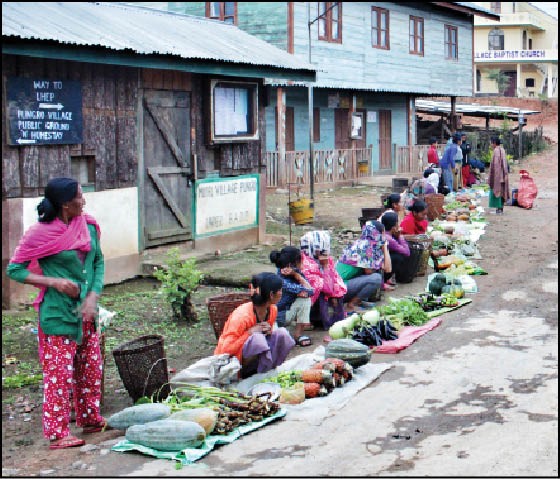Different Self-Help Group members sell fruits and vegetables at Tuesday Bazaar, an initiative of the SHG in Pungro village, Kiphire district. (Morung Photo)

Limasenla Jamir
Kiphire | April 12
The concept of Self-Help Groups (SHG) is not unknown to the Naga people, especially to the women folks. The popularity of SHG are on the rise and its impact can be felt profoundly. From financial aid to sustainable livelihood to self- employment, SHG are a source of encouragement and inspiration to many women living in rural Nagaland.
One such story of inspiration is the success of SHG in transforming the lives of an entire community. The concept of SHG was introduced to the women folks of Phuvkiu and Pungro village, Kiphire, by North East Initiative Development Agency (NEIDA) in 2016. Ever since, there has been massive transformation in the lives of the women folk in these two villages.
“Before the SHG was introduced in our village, we did not know what cleanliness was or anything about personal hygiene. We were living like pigs where the pigs would even come into the house and live with us” says Yitsishi, President of a SHG in Phuvkiu village.
“When we first introduced the concept of SHG, the villagers were reluctant to come forward and participate. Our first step was to teach them about cleanliness and hygiene. We taught and demonstrated the women folks how to use soap and bathe their children, how to maintain personal health and hygiene and maintaining a clean sanitation system at home,” Akhumla, a staff of NEIDA posted at Pungro village recalls.
There are 17 SHG in Phuvkiu village and 15 SHG in Pungro village. Each SHG has a minimum of 7 members and a maximum of 10 members. These SHG engage in small businesses, inter-loaning, cleanliness, health and hygiene and community concerned activities.
“I did not know the value of money and didn’t even know how to count money. My husband managed all the income and expenses at home. But after becoming a member of a SHG I have learned how to manage money and how to keep accounts” says Phulenshi, a 38 year old mother of three.
SHG members in Phuvkiu village organized a Liquor prohibition campaign and mass social work in the village with an attempt to have a clean village atmosphere while SHG members in Pungro village introduced Tuesday Bazaar in the village where different SHG members sell various vegetables, fruits and other food items. They have also started a tree and flower plantation campaign in the village along with a strict rule to keep dogs in the vicinity of their own homes.
“SHG has not only helped us in improving the standard of living but has also helped us in communicating with each other better and in sharing our ideas. Our husbands no longer keep us inside the four walls of our homes but rather encourage us to attend meetings and different activities of the SHG” says Imtila, Secretary of Village Level Organization, Phuvkiu village.
Basic trainings on book keeping, accounts, family planning and management were given to the SHG members during the first year of its introduction by NEIDA. Different projects of NEIDA were introduced and the SHG members were selected as the beneficiaries of the projects. Later, the Nagaland Rural Livelihood Mission intervened and further helped the SHG by giving financial aid.
“We have been introduced to new seeds, new improved way of rearing pigs and also new ways to earn money by NEIDA. We are able to look after our children and send them to schools and we no longer have to solely depend on our husbands for financial support in the family. By supplementing to the family’s income, I can proudly say that there is happiness in my family now. We don’t struggle as much as we did before” says Tsusangshe, a 53 year old women with 10 children.
The women folks of Phuvkiu and Pungro village have been made to understand the real purpose and functions of SHGs. Their contribution to their own families and also to the community is felt immensely. In just three years great transformations can be seen especially in the living standard of the villagers.
“We are hoping that in the next few years our efforts will help bring greater changes in the village and we can also live like those developed villages in other parts of the state,” added Lensangbhe, member of a SHG and a successful business woman in Pungro village.
Pungro and Phuvkiu village falls under Kiphire district and are inhabited by the Yimchunger tribe.


